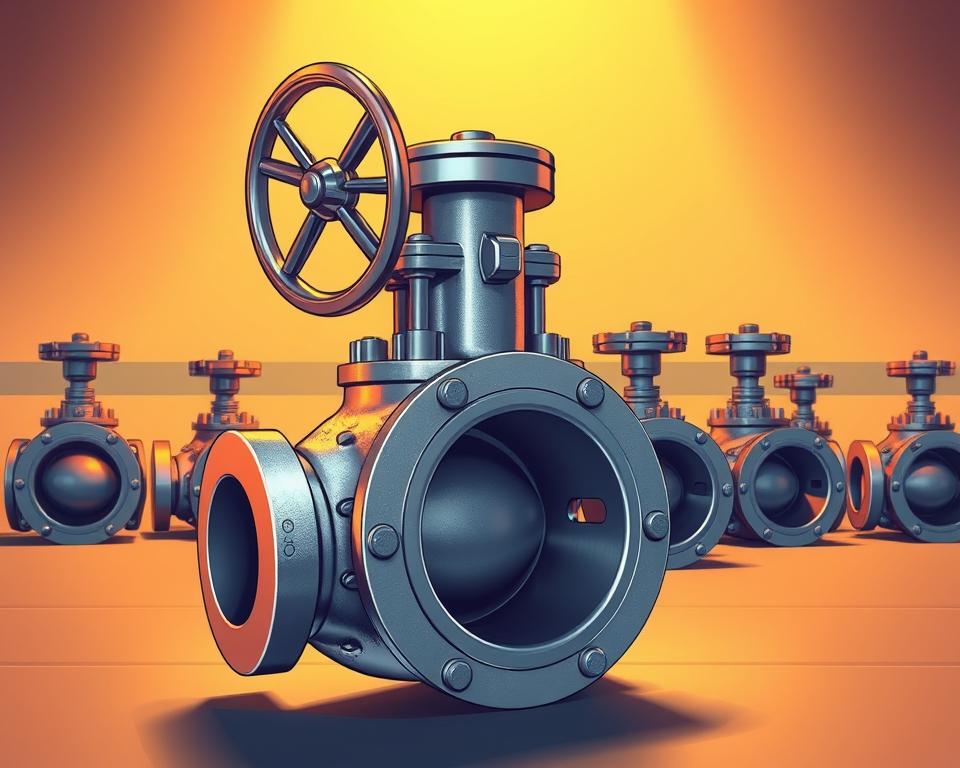Cast-Iron Gate Valves: Long-Lasting Industrial Flow Management
Quick stat: Over sixty percent of public distribution networks depend on conventional isolation gear for reliable isolation during emergencies.
We offer a heavy-duty line of Cast Iron Gate Valve Manufacturer built for extended service life in plant, building, and municipal use across the United States. Every valve combines a sturdy body and bonnet with a well-proven gate design to resist wear and reduce corrosion under changing pressure and temperature cycles.
The straight-through gate cuts flow restriction at full open, supporting transfer of water and suitable media with less pressure loss. Specifiers and technicians prefer the straightforward serviceability, widely used connection options, and readily available parts that speed up selection and repairs.
This family spans multiple series and pressure classes to match typical duty ranges, end connections, and operator preferences. Expect consistent sealing, steady operating torque, and economical ownership aimed at uptime and low life-cycle cost.
Highlights
- Designed for long-lasting shutoff and dependable flow control in demanding environments.
- Sturdy construction stands up to wear, corrosion, and mechanical stress.
- Straight-through design offers low flow restriction and lower pressure loss.
- Offered in a range of series and class ratings to match common specifications.
- Easy maintenance, common parts, and consistent sealing support uptime.
Reliable, Precise Flow Control with Cast Iron Gate Valves
Engineered shutoff units with precision wedges and finished seats offer consistent performance across commissioning, operation, and shutdown cycles. Solid iron bodies and tight seating yield consistent sealing. That reliability ensures safe isolation and reduces unplanned downtime.
Smooth-operating feel cut handwheel effort and let technicians position the wedge with confidence. Standard stems and accessories make it easy to adapt a valve to manual or automated controls. Less effort accelerates routine checks and repairs.

Rising vs Non-Rising Stem Performance
| Attribute | Rising-Stem | Nonrising Stem |
|---|---|---|
| Open/close visibility | High — visual indicator | Low — enclosed indication |
| Clearance needs | Needs headroom | Better for tight or buried service |
| Service | Straightforward inspection | Lower profile, same service life |
When fully opened, the full-bore passage delivers minimal headloss and high efficiency flow. Tight shutoff cuts leakage risk and maintains target pressure for downstream equipment. As a set, these features reduce total life-cycle cost and improve system uptime across common commercial and light industrial applications.
Specs, Designs, and Options for Cast Iron Gate Valves
Key design selections—body alloy, stem style, and flange pattern—dictate fit and performance as well as serviceability.
Body and Bonnet Build
The body and bonnet are cast iron for rigidity and resistance to vibration. Machined guides hold the gate true for reliable sealing.
Rising Stem vs Non-Rising Stem
A rising stem gives a clear visual position indicator and is simple to inspect but needs extra headroom. A non-rising stem minimizes vertical space and shelters threads in the bonnet.
Both stem designs pair with standard handwheels and can be prepared for actuators or external indicator posts when automation is required.
Class 125 performance guidance
ASME Class 125 is widely used for water and general service within moderate temperature ranges. Refer to published pressure-temperature limits to confirm suitability for the intended operating envelope.
Flange connections and dimensions
| Item | Standard | Remarks |
|---|---|---|
| Flange drilling | ASME/ANSI pattern | Compatible with typical piping |
| F2F length | Standard series lengths | Check spec sheet for exact dimension |
| Bolt pattern | Specified grade/torque | Select gasket to suit service |
- Range: covering small lines through large mains with varied series and trim choices for durability and maintainability.
- Trim choices and packing: seat and wedge materials blend tight shutoff and longevity; enhanced packing and bonnet gaskets improve stem sealing.
- Install tips: confirm end-to-end dimensions, flange bolt patterns, and torque requirements before installation.
Use Cases, Compliance, and Integration
Applications for these Resilient Seated Gate Valve span municipal mains, building risers/standpipes, and pump-room isolation points where consistent shutoff is critical.
Water distribution and fire systems routinely deploy these as sectional and control valves. They deliver readable position and robust shutoff for life-safety and utility networks.
Flow, shutoff, and bi-directional service
The gate design allows shutoff in both flow direction when installed per manufacturer guidance. This adaptability simplifies layout decisions and works with redundant runs.
Maintenance & Stem Sealing
Service-accessible bonnet hardware, guided gates, and serviceable packing make inspection and repacking faster. Proper packing adjustment maintains stem sealing during frequent operating cycles.
OS&Y Indicators and Best Practices
Outside indicators and OS&Y styles give visible open/closed status for inspections. Even with bi-directional service, adhere to the recommended orientation and clearance guidance to ensure safe operation.
| Use Case | Main Advantage | What to Verify |
|---|---|---|
| Water mains | Secure isolation | Verify Class 125 limits |
| Fire systems | Visible status for AHJ | Select indicator or OS&Y |
| Mechanical rooms | Service access | Confirm flange/F2F compatibility |
Wrap-Up
Invest in proven shutoff equipment that pairs sturdy construction with predictable flow control.
These gate valve solutions provide durable isolation and dependable control for water and utility service. Count on straightforward installation and easy maintenance for reliable long-term service.
Key specs include Class 125 rating, a robust body and bonnet, and engineered stem sealing to keep performance steady across building and plant environments.
Several series in common sizes, plus handwheel or actuator-ready options, simplify system matching. Visible position indication and smooth stem travel boost daily operation and response under shifting demands.
The gate wedge and seat delivers tight shutoff and low pressure loss. Double-check sizes, end connections, and accessories at specification time to move procurement and commissioning faster.
Pick valves produced under strict standards. Our team can review class, sizing, and series choices to align equipment with your operating and maintenance goals.
